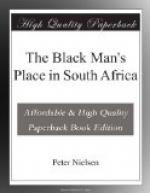There can be no doubt that the evil of miscegenation in South Africa has been greatly exaggerated, both in respect of its nature and its extent, but, nevertheless, so long as the racial prejudice of the white man remains as strong as it is to-day—and there is nothing to show that it is likely to decrease in the future—so long will it be the duty of all good citizens to discourage by persuasion and precept the production of children for whom the ruling race has no love and little pity. Even those among the whites who, in a spirit of good will and tolerance urge that the coloured people should receive preferential treatment because of the white blood which is in them, cannot escape having their point of view warped by their racial prepossession, for, surely, it is not because of a man’s class or colour that he is treated as a man to-day but because of his being a civilised member of a civilised community. Nevertheless, the day when civilisation shall be the sole qualification for full membership of the civilised community of South Africa is not yet.
I say, therefore, in answer to the question whether, without the full fraternity which seems impossible here, the white and the black races may not live together in South Africa in political liberty and equality, that the trend of events leads to the belief that the established pride of race of the whites, and the growing pride of race among the Natives will conduce to voluntary separation wherever this is possible, and that in this way the coming generations will contrive to live territorially separate under a common governance, founded upon political equality and liberty.
CONCLUSION.
The evidence before us leads inevitably to the conclusion that there is nothing in the mental constitution, or in the moral nature of the South African Native, to warrant his relegation to a place of inferiority in the land of his birth, but the same evidence also leads to the conclusion that the racial antipathy which prevails to-day will remain unaffected by this admission, seeing that this racial animosity is caused not by alleged mental disparity but by unalterable physical difference between the two races.
It is important that this distinction be grasped for it goes to the root of the matter. It is the marked physical dissimilarity of the black man that rouses the fear and jealousy of the white man, and not any inherent mental inferiority in him. And we must take human nature as we find it, inscrutable and immutable as it is; wherefore we must reckon with, and not hastily condemn, the imponderable purpose of a fundamental instinct which is older than speech and deeper than thought, so that, although we admit that this racial antipathy is not justified by logical reasoning, we may nevertheless recognise it as a feeling grounded in man’s inner nature—in his heart, so to speak—hardening it against other men whom he feels he cannot receive and entreat as brothers; in other words, we may say that this feeling is not the result of ratiocination but of forces that are deeper and more elemental than reason; that it is a hardening of heart rather than a mental conviction, in which sense we may apply the words of Pascal “Le caeur a ses raisons que la raison ne connait pas.”




